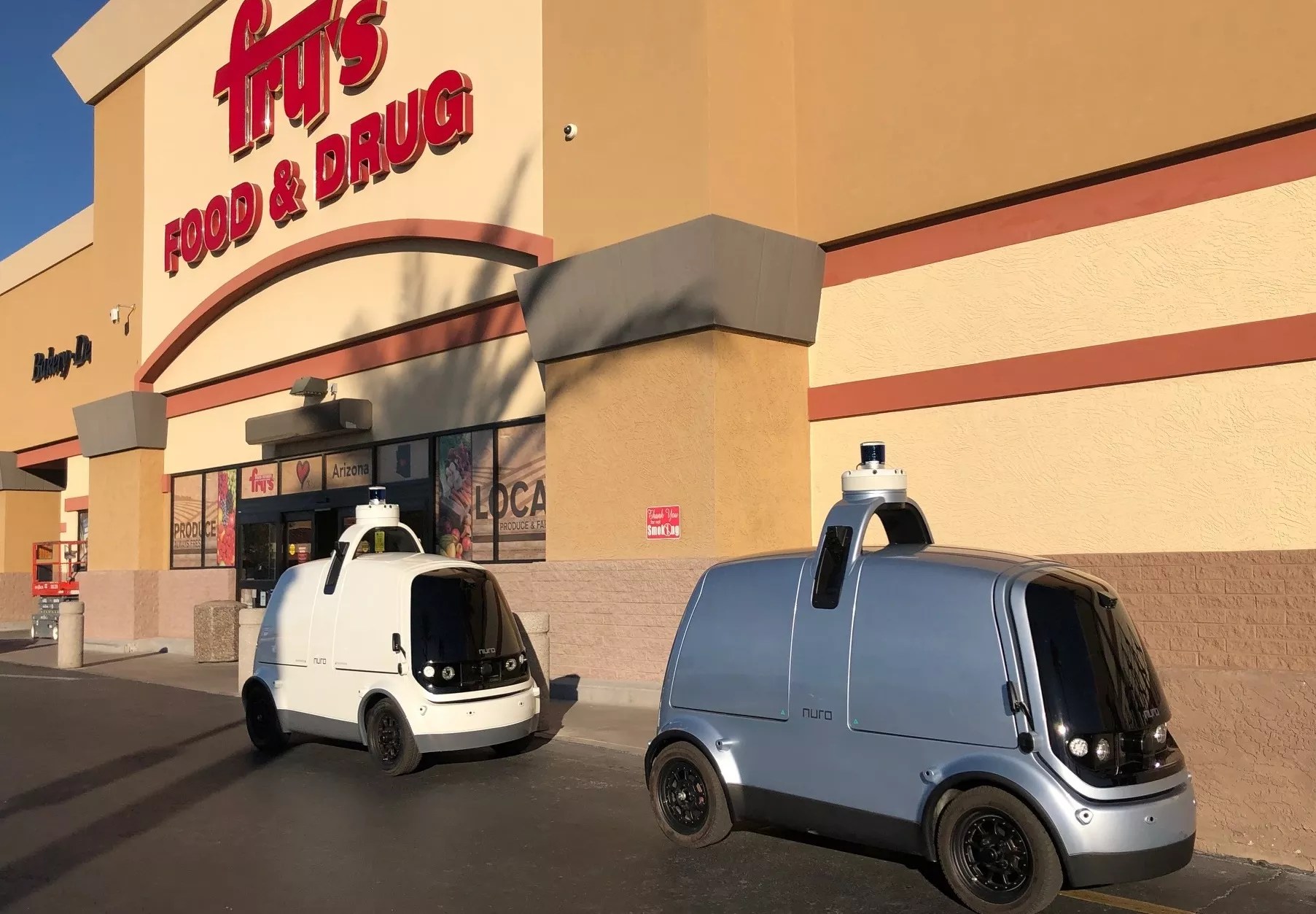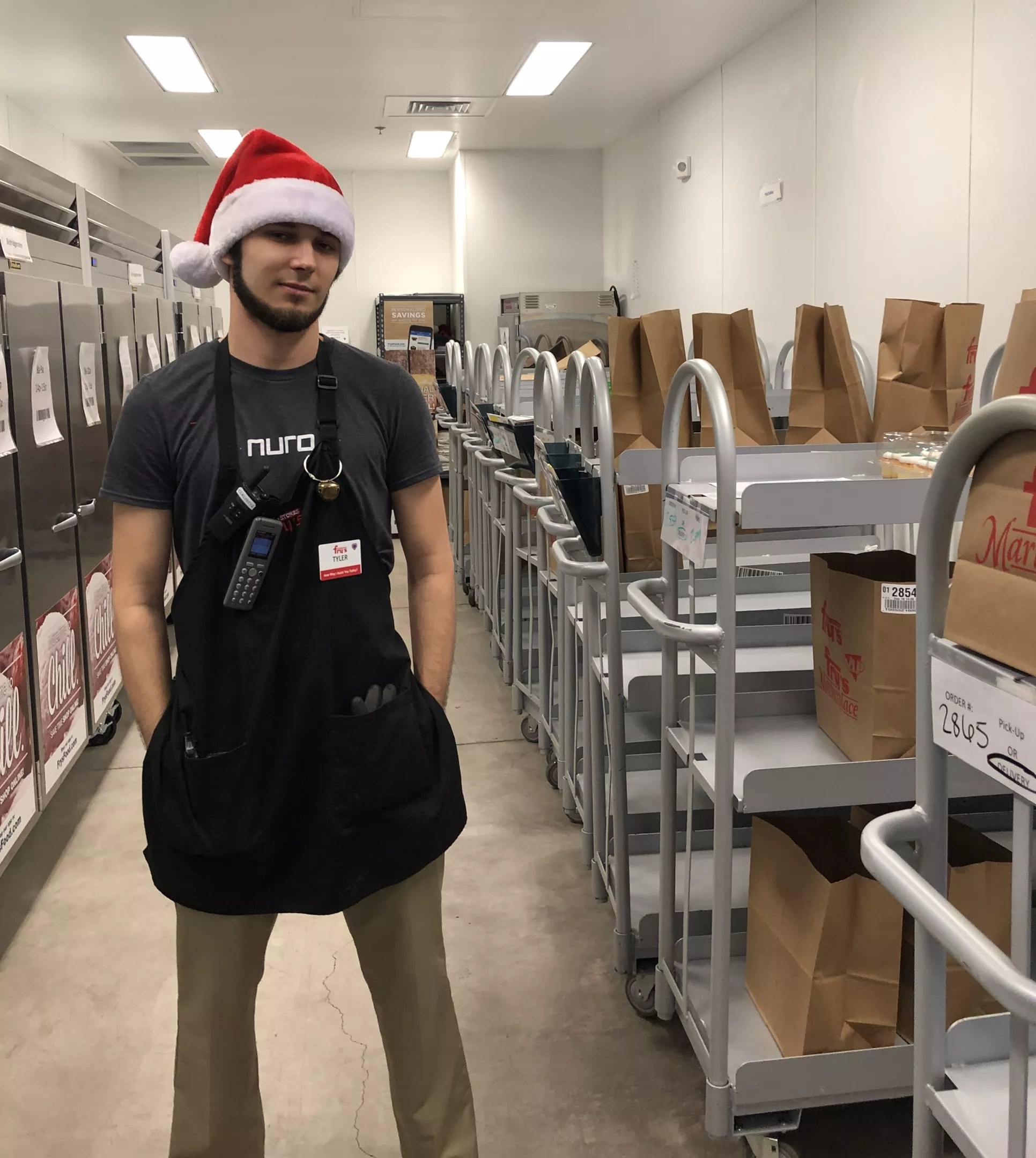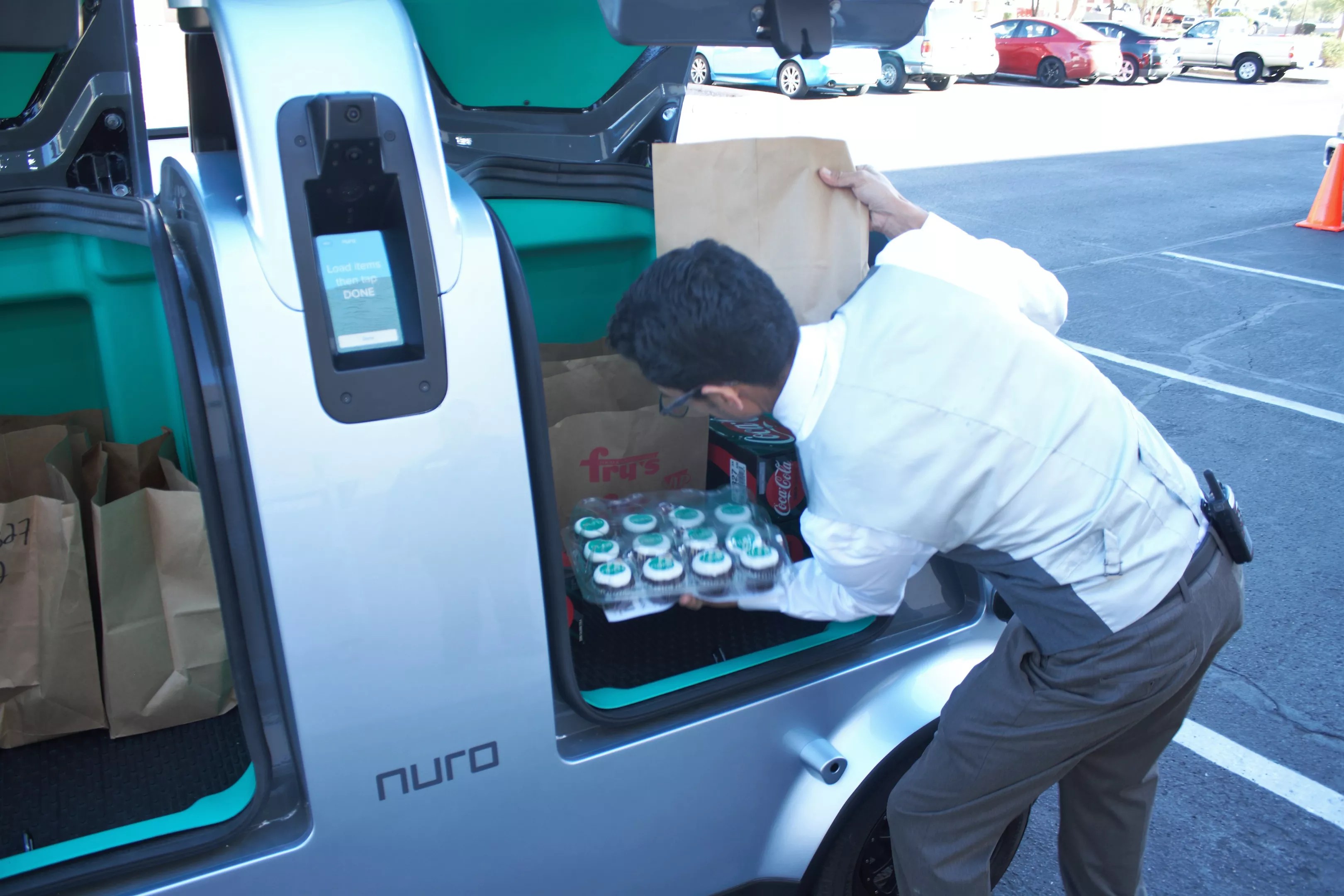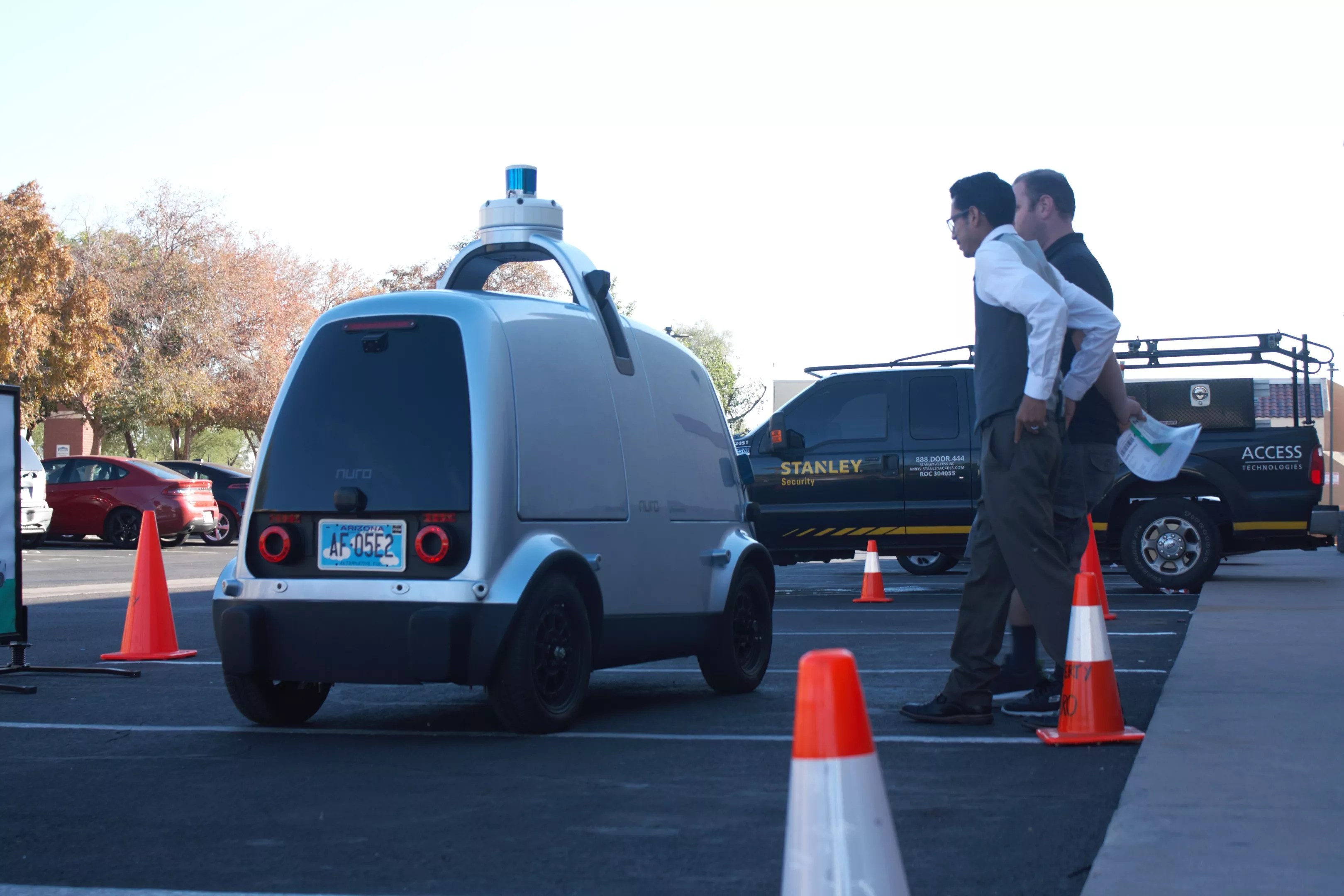
Pam Giannonatti

Audio By Carbonatix
Nuro and Kroger have launched a “first-ever” driverless delivery service for the general public in metro Phoenix, making Waymo look like it’s dependent on old-fashioned humans.
About as large as an ATV, the four-wheeled “R1” Nuro vehicles have no space for a driver or passengers. For now, they’ll roam only about a square mile of one small section of Scottsdale, delivering groceries from a neighborhood Fry’s store for a small fee. But that’s one small step for robots, and a possible giant leap for robotkind.
“It’s very cool. It’s a very new concept – it’s exciting,” said Tyler Tanner, a Fry’s employee who helps load groceries into the Nuro vehicles. Tuesday was the first day the service went online.
According to supermarket giant Kroger, anyone in the 85257 ZIP code can use the Fry’s Food Stores website or a mobile app to get a Nuro vehicle to bring groceries for a flat $5.95 fee, with no minimum purchase.
“…We don’t anticipate any issues outside what we normally see with vehicles operated by humans…” — Scottsdale police.
“When it first pulled up to do our first delivery, it was very interesting,” Tanner said. “You know there’s nobody in there.”
Loaders and customers use a keypad on the vehicles to open the gull-wing doors. Humans still need to load and unload the vehicles. If the vehicles have a problem, they can communicate with a Nuro team, Tanner said.
Arizona’s a hotspot for autonomous vehicle testing because of Governor Doug Ducey’s policy of lax regulation that may have contributed to the March 18 death of pedestrian Elaine Herzberg in Tempe by an Uber car in autonomous mode. Nuro and Waymo, both secretive California firms, have led the pace of autonomous vehicle technology in Arizona since the fatality, which drove Uber to leave the state.
Waymo, owned by Google parent Alphabet, has more experience under its belt than Nuro and recently launched the country’s first taxi service using autonomous vehicles. But Waymo over-promised its capabilities, with its CEO claiming the company would field a fully driverless, taxi-like service in the Phoenix area by the end of the year. It didn’t meet its goal, causing Waymo to acknowledge that nearly all of the trips in the ridesharing service, which also launched this month, will utilize backup drivers behind the wheel and will be available only to previous users of its Early Rider program.
Nuro will now be the first company to have a regular, commercial service involving a totally driverless vehicle – albeit one without as many safety concerns because it delivers only food and beverages, not passengers. The R1 is also fully electric, while Waymo’s Chrysler Pacifica fleet uses gasoline. However, Waymo claims a range of about 100 square miles for its vehicles, and the company has driven its vehicles for millions of road miles.
Nuro has practiced with its autonomous Prius vehicles, which use backup drivers, for several months now in Scottsdale, since announcing the partnership with Kroger in June. Its R1 experiment in Scottsdale will have a slow rollout – literally. The delivery service will be available only in the neighborhood around the Fry’s at 7700 East McDowell Road. The R1s will stick to roads with a 25 mph speed limit and won’t drive on McDowell or Scottsdale roads. A “chase” vehicle will drive behind the robots and follow it to the deliveries and back.
Kroger’s goal is a “seamless” shopping experience for many different sorts of customers, said Pam Giannonatti, Kroger corporate affairs manager for the Fry’s division
“Kroger has a vision of a shopping experience for everyone,” she said. “We’re really valuing the technology that’s coming into play.”

Tyler Tanner’s job at Fry’s now includes loading groceries into a fully driverless, robotic delivery vehicle.
Ray Stern
She was less sure of how the program would measure success. Are Nuro vehicles, perhaps with the low price of their delivery, expected to boost popularity of home delivery of groceries?
“I don’t know,” Giannonatti admitted, adding that increasing deliveries would be good, but it’s not the goal as much as creating more options for shoppers.
Giannonatti also didn’t know which entity would be legally responsible, Nuro or Kroger, if the Nuro vehicles hit something or someone. Ducey’s office told Phoenix New Times earlier this year that a company could be held criminally liable if it caused a death and its actions were negligent.
“Safety is a top priority,” Giannonatti said.
While the state still has fewer rules for autonomous vehicles than neighboring California, Ducey published an updated executive order in March, just two weeks before Herzberg’s death, that requires companies to commit to a few basic safety standards. One standard is that all companies intending to operate fully driverless vehicles on Arizona roads file a “law enforcement interaction protocol” with the state that tells first responders how to deal with the vehicles, should they encounter one that’s disabled or been in a crash.
Officials with the Arizona Department of Transportation told New Times on Tuesday that Nuro had a protocol on file. But ADOT was unable to release the document on Tuesday, saying it had to wait for legal review and “input” from the company. State public records law doesn’t generally allow agencies to withhold records based on a company’s whim; New Times will update this article when ADOT releases the documents.
Similarly, the state Department of Public Safety took all afternoon to acknowledge that it had received a copy of the required document from Nuro, and then a spokesperson declined comment after hours.
Scottsdale police spokesman Sergeant Ben Hoster said the city also received a copy of the protocol on November 1.
“Officers working Nuro’s operating area have been briefed on the vehicles,” Hoster said in response to New Times’ questions. “While we don’t anticipate any issues outside what we normally see with vehicles operated by humans, we are prepared to respond regardless.”
Emma Esrock, a public relations representative for Nuro listed in the announcement by Nuro and Kroger on Tuesday, didn’t return messages, nor did a Nuro liaison with Kroger.
Waymo, in response to questions, asked a question about the Nuro vehicles, then didn’t respond to further questions.

A Fry’s worker loads groceries into an R1.
Tyler Tanner

Nuro’s R1 driverless cars debuted on Tuesday at a Scottsdale Fry’s grocery store.
Tyler Tanner